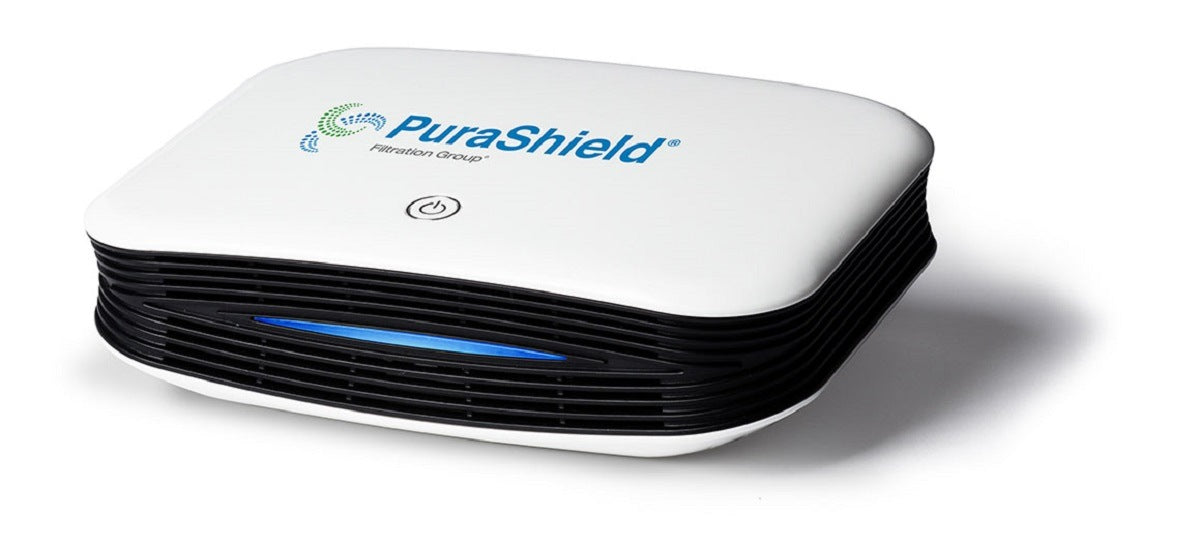Air scrubbers and air purifiers are descriptions often used interchangeably. Both are air cleaning devices that focus on removing harmful particulates in the air such as dust, pollen, and other floating debris. Some are more technologically advanced or commercially focused; some are integrated into HVAC systems, while others are designed to be portable. Let’s look at how they function and which is best for your needs.
What Is An Air Scrubber?
Air scrubbers are air filtration devices that work to improve indoor air quality by removing particulate matter and other airborne pollutants.
Types of Air Scrubbers
There are three main types of air scrubbers:
- Dry scrubber
- Wet scrubber
- Integrated scrubber
Dry scrubbers pull air through a series of filters and push out “clean” air. The best dry air scrubbers use multiple filters. This allows each filter to focus on a different type of particulate matter. The filter stack includes a HEPA filter, which is fine enough to remove bacteria and most viral particles from the air. The dry air scrubber is often also referred to as an air purifier since they share many features.
Wet air scrubbers are air treatment systems typically used in manufacturing buildings and plants. Most use a mist that adheres to dust and other airborne particles, some also collect toxic gases. Advanced systems contain multiple components including fans, mist eliminators, pumps, a collection vessel, and ductwork.
Integrated air scrubbers are not portable devices; they are designed to be a part of an existing HVAC system. These can be sized anywhere from huge commercial buildings to the most modest of residential homes. Their goal is to provide an extra level of high performance air filtration both as air first enters a building and as it circulates through the ductwork.
What Does an Air Scrubber Do?
Air scrubbers (depending on their capabilities) work to remove chemicals, gases, fungal spores, dust particles, pet dander, pollen, smoke, bacteria, viruses, and other airborne pollutants. Depending on their capabilities and capacity, they can have different purposes. Industrial strength air scrubbers are often used to remove airborne emissions such as smoke, chemicals, and gases in commercial or industrial spaces. Portable air scrubbers can be found with a wide range of capabilities. They are usually designed for residential or small office use; some have been designed to travel with you on public transport or to sit on your office desk.
How Does an Air Scrubber Work?
Contaminated air is drawn in by an air scrubber, which filters out particles before releasing clean air back into the environment. HEPA filters use UV light to kill bacteria, viruses, and other microbes or trap dust, pollen, and mold spores while air scrubbers that use ionization release charged ions that capture bacteria and mold. By continuously cycling and purifying indoor air, air scrubbers improve air quality and create a healthier environment in your home or business.
Air scrubbers have multiple filters that serve various purposes targeting different sizes and types of pollutants. At minimum, most of these will consist of a pre-filter and a HEPA filter. It is notable that the Purashield 500 air scrubber uses an advanced four stage filtering system:
- Pre-filter: This filter collects dust, pollen, and other bigger particles.
- Molecular filtration: Patented molecular filtration captures and removes air particles that carry viruses.
- PuraWard filter: The PuraWard filter shields people from germs, mold, and virus particles by using copper and silver ions.
- HEPA final filter: HEPA filters collect nearly all microorganisms, allergens, PM 0.3, PM 2.5, and other small particles. Smoke particles are eliminated by a HEPA-rated filter, but gasses are left behind.
A HEPA-rated filter removes smoke particles but not gases or odors. To remove gasses and odors, the scrubber must contain activated carbon, alumina, and potassium/sodium permanganate.
Air Scrubber vs Air Purifier
Let’s examine some of the differences between an air scrubber vs purifier.
Air quantity capabilities - An air scrubber is often larger, designed for commercial spaces, and has the capability of cleaning enclosures of thousands of square feet, whereas air purifiers generally only cover hundreds, meaning that you’d need to purchase multiple purifiers to cover your entire home. Usually, each room should get its own air purifier.
Ozone - Air scrubbers shouldn’t release ozone emissions but ionizing air purifiers can create ozone as a purposeful method to purify air. The EPA has stated that ozone is ineffective at air purification, and although it can break down certain chemicals, such as tobacco smoke, it does not remove dust, dander, or allergens. Studies have found that there are negative effects from short-term ozone exposure and that ozone is harmful to breathe.
Methods - Some experts say that the major difference between an air scrubber vs purifier is that an air purifier is single filter-based while an air scrubber uses multiple filter levels and/or UV light to attack germs and particulate matter.
(We might be biased, but it sounds like air scrubbers are better 😉)
Air Scrubber FAQs
For best effect, air scrubbers should run constantly. They take some time to fully filter the air in a room, so if you’re entering an area with a small air scrubber, it may take a couple hours before the room’s air has been completely “cleaned”. Air scrubber filters will need to be replaced according to manufacturer guidelines, but most last 6 months and replacements are relatively inexpensive.
Is An Air Scrubber Worth It?
If major indoor air quality improvements are your goal, an air scrubber is certainly worth the investment. The EPA states that indoor air can be 2 to 5 times more polluted than the outdoor environment. Since Americans typically spend 90% of their time indoors where pollutants are higher, the air we’re breathing can definitely have negative effects on our health. Air scrubbers are also a good investment for anyone working on home renovations since the dust, mold, and VOCs being released can have lasting detrimental effects.
Do I Need An Air Scrubber?
Whether or not you need an air scrubber depends on your goals and current air quality. Investing in indoor air quality testing can help you decide whether you need to consider upgrading your home air filtration to higher MERV filters or more complete devices like an air scrubber.
Does An Air Scrubber Attach To Your HVAC?
There are integrated air scrubbers that attach to your HVAC system as well as portable air scrubber appliances. An integrated scrubber will be beneficial in helping clean your entire home and is one of the main benefits of choosing an air scrubber over a smaller, portable air purifier.
Will An Air Scrubber Help Allergies and Asthma?
An air scrubber will definitely remove particulate matter like pollen and dust that can worsen symptoms of allergy or asthma sufferers. Improving indoor air quality by removing the majority of toxins like these can help ease discomfort indoors, and portable air purifiers can help keep symptoms at bay when you’re traveling.
What Pollutants Can An Air Scrubber Remove?
Air scrubbers help allergy sufferers because they remove airborne pollutants like dust, pollen, and pet dander. They stop the transmission of disease by capturing pollutants like bacteria, viruses, and mold spores. Air scrubbers also neutralize chemical pollutants like volatile organic compounds (VOCs) released from household items and eliminate aromas from cooking, smoke, and pets.
Why Is An Air Scrubber Beneficial For Health?
An air scrubber creates a cleaner and safer environment. By absorbing dust, pollen, and pet dander, it reduces the symptoms of asthma and allergies. An air scrubber reduces the risk of respiratory infections and diseases by capturing airborne germs, viruses, and mold spores. It eliminates volatile organic compounds (VOCs), which can lead to long-term health problems, headaches, and discomfort. An air scrubber promotes better sleeping conditions, and easier breathing while improving everyone's health in the family.
Where Are Air Scrubbers Commonly Used?
To enhance the quality of the air, air scrubbers are used in residences, medical facilities, businesses, and industrial environments. They minimize allergens, odors, and infections in homes, and they block the transmission of bacteria and viruses in medical facilities. Air scrubbers are useful in gyms, businesses, and educational institutions to keep the air clean. They’re also used at industrial sites to reduce chemical emissions, smoke, and dust. When clean air is a priority, air scrubbers are useful for reducing pollutants during building or remodeling projects.
What Types Of Air Scrubbers Are Available?
There are different kinds of air scrubbers, each intended for a specific use:
- Wet Air Scrubbers: These are used in industrial settings to trap dust and chemical fumes. They use water or a liquid solution to capture and neutralize airborne particles, gasses, and odors.
- Dry Air Scrubbers: These devices are used in homes and businesses to improve the quality of the air by collecting pollutants and particles using filters.
- Integrated Air Scrubbers: Integrated with HVAC systems, these provide high-performance air filtration.
Can An Air Scrubber Help With Mold And Mildew?
By eliminating airborne mold spores and lowering the conditions that encourage their growth, an air scrubber can help combat mold and mildew. Mold spores are captured and neutralized by air scrubbers with UV light technology or HEPA filters before they settle on surfaces and grow. Air scrubbers prevent mold growth by increasing air circulation and lowering humidity when used with a dehumidifier. To completely eradicate mold infestations, also use a dehumidifier.
How Does An Air Scrubber Improve Indoor Air Quality?
Air scrubbers improve indoor air quality using filtration systems and by removing airborne pollutants and toxins. Ultraviolet germicidal irradiation occurs as air passes through the UV light chamber in the scrubber., disrupting the DNA or RNA of bacteria. Ionization releases charged ions (positive or negative) into the air, attaching to bacteria, or mold spores, making them easier to capture in the air scrubber. Through air cycling and purification, they can improve the respiratory system, lessening exposure to contaminants by creating a cleaner, healthier atmosphere.
Is An Air Scrubber Noisy During Operation?
An air scrubber’s noise level depends on its size, type, and settings. Many air scrubbers emit a low hum, somewhat like a household fan. Larger industrial models, or those operating at higher speeds can be noisier because of their powerful filtration systems and fans. Fortunately, many air scrubbers have settings that are programmable, allowing users to reduce fan speed for quieter operation.
Can Air Scrubbers Eliminate Odors Completely?
Depending on the source and intensity of the smell, air scrubbers can reduce smells. Using HEPA or activated carbon filters, they absorb odor-causing substances including smoke, pet dander, and cooking smells. Some air scrubbers eliminate odors at the molecular level with ionization or using UV radiation. They work well for most indoor smells, but more cleaning treatments may be needed to eliminate longer-lasting smells on walls or in carpets.
How Long Does It Take For An Air Scrubber To Clean A Room?
The time it takes for an air scrubber to clean a room depends on the size of the space, the degree of contamination, and how powerful the air scrubber is. An average-sized room usually takes about 30 minutes to several hours to improve the air quality. Larger spaces may take longer or need a more powerful unit.
Get more tips on air filtration in our guides to improve your indoor air today.

